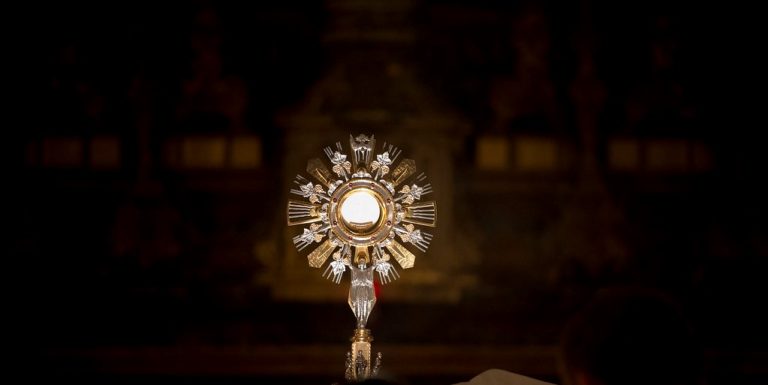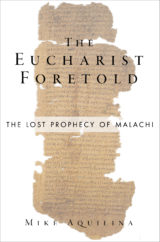By Mike Aquilina
Mike Aquilina is executive vice-president of the St. Paul Center and a contributing editor for Angelus News. He is author of more than fifty books, including The Eucharist Foretold: The Lost Prophecy of Malachi.

The new day dawns first on Kiribati. It has to start somewhere, and the International Date Line makes a sudden dodge to the east to avoid slicing this sprawling chain of coral atolls in two with the blade of the calendar. It’s a country with a Catholic majority, and as the first rays of sunlight gild the tops of the coconut palms, morning Mass is already under way.
As the earth keeps turning, the sun is soon rising over the great metropolis of Manila, capital of the Philippines. It’s a city of thirteen million already in the grip of its Sunday-morning rush. Horns are honking; people are pouring into buses; bicycles are weaving in and out of traffic; wildly colorful jitneys are roving the streets. But in the great Cathedral, the sounds of the city are a forgotten undertone as the host is elevated. Since the 1500s, this has been a city where Catholics gather in great numbers for the sacrifice of the Eucharist.
Still the sunlight advances around the globe, and now it’s bright mid-morning in Kerala, where—if we believe the universal tradition of the local church and the ancient writers—the apostle Thomas planted the church that still flourishes here today. In this place the ancient liturgy continues to bring in crowds of believers who proudly call themselves Christians. They have been meeting for the sacrifice of the Mass since long before there was a France or a Germany or an England, and their Mass is steeped in local color. But it’s the same sacrifice, the same Eucharist that goes back to Christ in an uninterrupted line.
Soon, as the light pours westward, it’s noon in Jerusalem, the city where Christ walked and preached and died and rose again, where churches mark all the important sites associated with his last days before his sacrifice on the cross. And here, where Christ himself offered the first Eucharist, that same Eucharist is still offered before pilgrims from every nation under the sun.
In Rome, the Eternal City, the pope is saying Mass in St. Peter’s Basilica, the largest and most magnificent church in the Christian world. Rich vestments, expensive incense, and an enormous choir are there to make the occasion an impressive spectacle. But meanwhile, the Mass is also going on in an out-of-the-way suburban parish where the faithful poor gather. The vestments aren’t as rich, and the congregation will have to do its own singing today. But the miracle is the same. On both altars, the sacrifice of Christ on the cross is made present to the worshipers in that particular place and at that particular time, because it is everywhere and for all time.
Light washes over Africa, and we pay a flying visit to Lagos in Nigeria, a country of many religions, but one where the Christian faith has such a strong presence that the region produces surplus priests for export. Here the liturgy is a beautiful spectacle of splendid colors and robust African harmonies. But it’s the same Mass, the same sacrifice of the Eucharist.
The day grows older, and across the Atlantic, afternoon Mass is being celebrated in the beautiful old city of Salvador de Bahia in Brazil. Since the Portuguese settled the Brazilian coast, the faithful have gathered for Mass. The congregation here is a wonderfully diverse mixture of people whose ancestors were native Brazilian, African, Portuguese, Japanese, Italian, German, and from every other corner of the globe.
We continue westward, and it’s time for late-afternoon Masses in Pittsburgh, a city whose mighty industries lured immigrants from all over Europe. Even today you can occasionally hear the liturgy in Polish or Italian or Ukrainian or Croatian—or any of a dozen other traditional languages. But it’s the same sacrifice, and the same Church that offers it.
And finally, as the day comes to an end, we visit French Polynesia, where once again we’re in the land of tropical breezes and coconut palms waving in them. As the sun sets for the last time on today, evening Mass is already being said. It’s tomorrow in Kiribati, and the whole cycle is on its way around the world again.
For from the rising of the sun to its setting my name is great among the nations, and in every place incense is offered to my name, and a pure offering; for my name is great among the nations, says the Lord of hosts. (Mal 1:11)
Whenever the early Christians talked about the Mass, that prophecy from Malachi was sure to come up. The Mass, they believed, was its obvious fulfillment. And our trip around the world seems to be a perfect picture of what the prophet Malachi was talking about. In every nation, from the rising of the sun to its setting, the Mass is offered. It’s in hundreds of different languages, with different music, different costumes, different customs—but always the same sacrifice, always the same “pure offering.”
We’re living in that world Malachi saw in his vision. The nations—the Gentiles—are offering sacrifices to the God of Israel all over the world.
You Might Also Like

One Old Testament passage seized the imagination of the early Church—and directed Christian hearts and minds toward the Eucharist. It was the oracle of Malachi 1:11, and it was cited (like Isaiah’s Suffering Servant oracles) to prove the identity of the Messiah through His Church and His Sacrament.
In The Eucharist Foretold: The Lost Prophecy of Malachi, Mike Aquilina reveals that the Messiah’s true identity—and the identity of the Eucharist—helps us find our identity as “catholic,” and will lead us to discover our roots in the religion of ancient Israel. To the early Christians, Malachi’s oracle defined who they were individually and as a Church.

